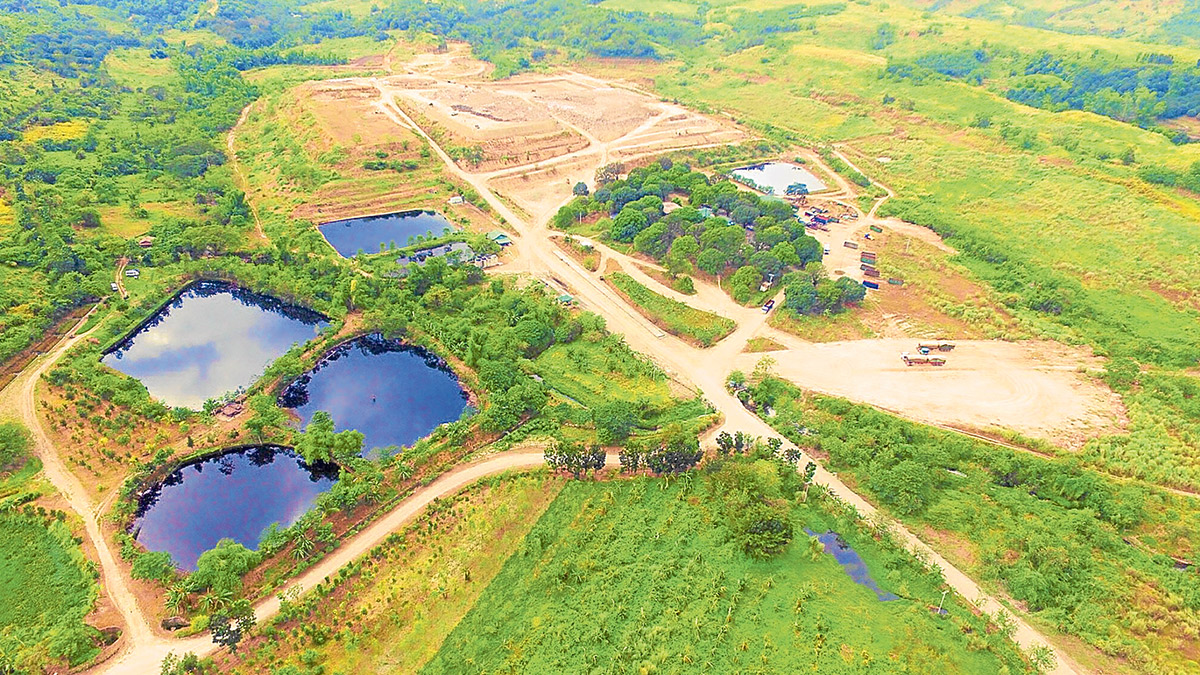BCDA to close Tarlac landfill; over 100 LGUs to lose dump access

GONE SOON A portion of the 100-hectare engineered sanitary landfill at Sitio Kalangitan in Cutcut II village, Capas, Tarlac, is considered the most modern waste disposal facility in the country. The landfill, however, is set to be closed by the Bases Conversion and Development Authority and Clark Development Corp. on Oct. 9. —METRO CLARK WASTE MANAGEMENT CORP. PHOTO
MABALACAT CITY, PAMPANGA, Philippines — The Bases Conversion and Development Authority (BCDA) will proceed with the closure of the 100-hectare modern sanitary landfill in New Clark City in Capas town, Tarlac province, which takes trash from 122 local government units (LGUs) in central and northern Luzon, despite objection from the host municipality.
The presence of a landfill in New Clark City was deemed “inconsistent” with the plan to turn the area into a tourism and investment destination, officials of the agency said Monday.
READ: Tech hub to rise in New Clark City
The BCDA made the remarks two weeks after Capas Mayor Roseller Rodriguez issued a statement opposing the impending closure of the German technology-engineered sanitary landfill in the subvillage of Kalangitan of New Clark City, which is being run by the Metro Clark Waste Management Corp. (MCWMC).
MCWMC is a joint venture of Filipino investors and Germany-based BN Ingenieure GmbH and Heers & Brockstedt Umwelttechnik GmbH.
Article continues after this advertisementAt least 70 percent of the 100-ha site is allotted to a landfill, 10 percent for recycling and 15 percent for environmental buffer. The remaining 5 ha are being used for offices and other purposes.
Article continues after this advertisementInconsistent with vision
According to MCWMC’s website, its clients include thousands of industrial, commercial, and residential locators inside the Clark Freeport and Subic Bay Freeport zones and more than 100 cities and municipalities.
In a statement, the BCDA said it was not keen on renewing MCWMC’s 25-year contract that is expiring this year, saying that the agency “maintains that a sanitary landfill is no longer consistent with the government’s vision of transforming New Clark City into a premier investment and tourism destination.”
New Clark City, which is part of a former American military base, is being developed by the BCDA as the country’s first “smart, resilient, and green metropolis.”
The BCDA, citing the opinion of the Office of the Government Corporate Counsel, added that extending the contract between MCWMC and Clark Development Corp. (CDC) “would be against the build-operate-transfer (BOT) law,” which was used in the bidding and awarding of the contract for the sanitary landfill project.
However, the BCDA did not cite the provision of the BOT law that would be violated if the government renewed its contract with MCWMC. CDC is a subsidiary of the BCDA.
Consequences
On May 22, Rodriguez said the impending closure of the Kalangitan sanitary landfill in October this year would not only disrupt the waste disposal practices but would also have “far-reaching consequences” that include loss of revenue for his town and loss of jobs and livelihood for residents working at the landfill and nearby waste treatment facilities.
While Capas officials and residents have appealed to the BCDA and CDC to renew MCWMC’s contract to operate and manage the sanitary landfill, Rodriguez said a legal action might be filed against the two state-owned agencies “as a last recourse.”
The mayor, in a separate statement, said the MCWMC facilities’ closure would cause “severe environmental and health crises,” as the 122 LGUs in central and northern Luzon that currently depend on Kalangitan sanitary landfill for their waste disposal will have nowhere to bring their trash. Among the LGUs that send their wastes to landfills are Baguio City and the City of San Fernando, the provincial capital of Pampanga.
Officials of the City of San Fernando and of other places have expressed their concern about the impending closure of the Kalangitan sanitary landfill.
Alternative
The BCDA said it would assist LGUs and locators in Clark “to explore alternative solutions for the affected stakeholders’ waste disposal requirements to ensure no disruption of solid waste management services.”
Citing a report from the Department of Environment and Natural Resources-Environmental Management Bureau (DENR-EMB) in central Luzon, the BCDA said there are two existing facilities in Pampanga that may be utilized upon the end of MCWMC’s contract.
“These facilities have a combined total capacity of 3,500 metric tons of domestic waste per day and the potential to expand further to 6,000 MT,” it said.
The BCDA said its local officials were also invited to the opening of another materials recovery facility in Porac, Pampanga, with a capacity of 5,000 MT per day.
“This brings the total combined capacity to 11,000 MT, which is more than enough to address the solid waste management requirements of Tarlac, Pampanga, and other provinces in and around the region. This should allay fears of a looming garbage and health crisis in the region,” it said.